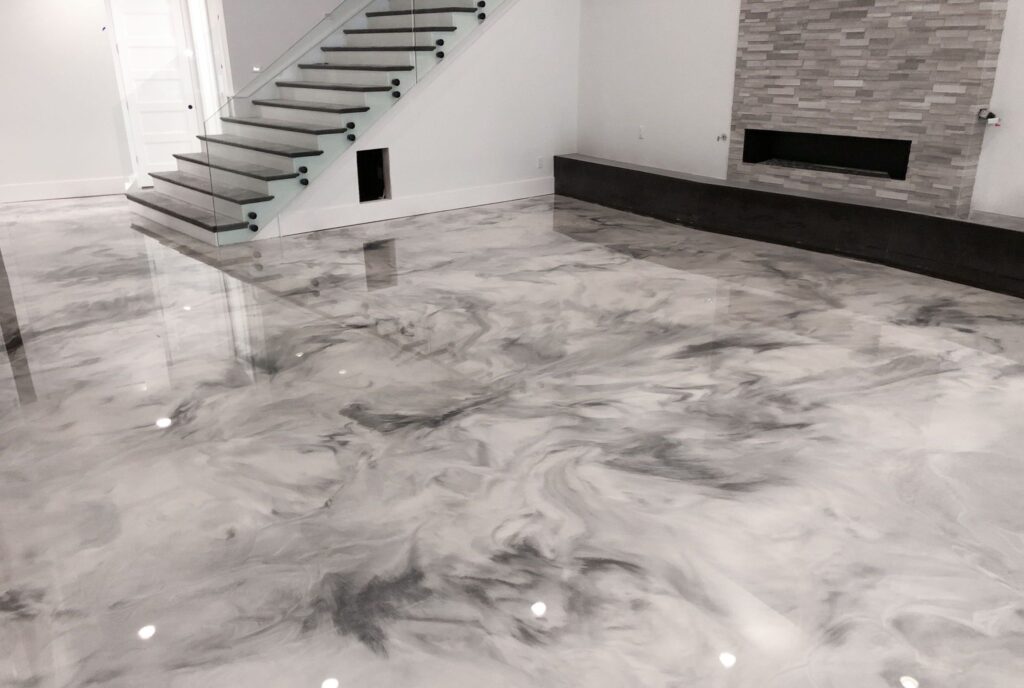Epoxy flooring is commonly used in garages, supermarkets, and stores due to its relative low-cost per square foot, slick look, and high resistance.
However, homeowners can also use this incredibly versatile type of flooring in their homes in many ways – the garage and the basement being common picks, though they can be used basically anywhere around the house.
Let’s take a deep dive into the popular trend of epoxy floor coating and all their pros and cons so you can make an informed decision!
“If you're not making mistakes, then you're not doing anything. I'm positive that a doer makes mistakes." – John Wooden
PROS of epoxy flooring

Low-cost
One of the first things you’ll notice about epoxy flooring is that it’s fairly cheap when compared to other types of flooring. Epoxy is a liquid-like resin that is laid on the floor and then left to dry, making the application quite different from tile or hardwood installation, for example.
The application itself may require a good deal of prep work (which I’ll explain more later), but due to the simple nature of the material, it’s quite inexpensive compared to tile or wood flooring.
Protective layer
Concrete and even wood flooring can absorb water, which greatly facilitates mold growth, as well as spreading germs and bacteria. But a good coat of epoxy flooring removes that problem entirely, protecting the subfloor from anything that might come to harm it. This is why the epoxy concrete floor combination is so common in high-traffic areas.
Visual variety

Not only does epoxy flooring support a great range of colors, but the finished product looks incredibly slick. It’s smooth and shiny to the point of being reflective, giving the flooring a proper “complete" look you just can’t get from raw concrete.
Versatility
One of the craziest things about epoxy flooring is that it can be applied on top of other flooring types, being the premier choice for covering concrete floors in garages and basements. And due to the previously mentioned visual variety with the material, it can give a drab room an elegant look for a great price.
Resistance and durability
I’ve already mentioned that epoxy flooring is great for garage floor coating, and durability has a lot to do with it. This type of flooring is decently resistant to any abrasive chemicals in moderate exposure, being very hard to stain and scratch. The resin also doesn’t absorb water, which is why it’s so commonly used to cover concrete floors.
It’s also very resistant to heavy weight stuff, including anything from bulky furniture, high-traffic areas and even vehicles. And because it doesn’t absorb liquids, it’s easy to keep it clean and free of germs and bacteria.
CONS of epoxy flooring

Relatively short lifespan
This is a bit of a controversial topic, so let me explain: the lifespan for epoxy flooring isn’t that bad for what it sets out to do. In a high-traffic setting (such as an auto shop or store) it’s about 3 to 5 years at most. For a home setting, due to less strenuous conditions, it can go up to 5 comfortably, but you should expect to recoat it by then.
When compared to other flooring types, this is noticeably worse. For example:
- Vinyl flooring is up to 20 years.
- Laminate flooring has a lifespan of 15 to 25 years.
- Hardwood flooring is at least 25 years with a maximum lifespan of a whopping 100 years.
Obviously, all of this assumes no negligence when it comes to maintenance, but you get the idea.
Struggles in moist environments

Epoxy flooring has a hard time “sticking" to concrete in really moist environments, which may require a good deal of preparation before it’s applied. For example, in a basement that is known for having moisture problems, the application might be more difficult. Excessive moisture can even cause the epoxy to “rise" off the floor, even after it’s dried.
Slippery if wet
Epoxy flooring isn’t particularly more slippery than other flooring types, especially when properly textured… but it does get pretty slippery when wet. Basically, you don’t want this in a kitchen or places where spills are more prone to happen.
Though, as mentioned before, this con can be mitigated to a degree by texturing your floor or installing anti-slip tape in strategic places.
Application is time consuming
The application isn’t very complicated from a practical standpoint when handled by a pro, but it does take some time.
- To start off, the area must be prepped, which can take longer depending on certain obstacles (such as the aforementioned moisture issue).
- The drying can take a few days and the area must be vacated in the meantime because epoxy flooring emanates toxic fumes during application and while it’s drying, being safe only after it has dried. The entire process can take several days.
Conclusion

Hopefully with this guide you were able to measure the pros and cons and decide if the material fits your needs. The bottomline is that epoxy flooring isn’t ideal for all situations, but as a high-resilient layer of protection – especially for concrete, it gets the job done in style.
Ready to learn more about epoxy flooring cost? Get free quotes from flooring professionals in your area today and start making plans!
MORE FROM HOMEYOU
The Pros and Cons of Hardwood Flooring
5 Reasons Why Waterproofing Your Basement is Essential
The Pros and Cons of Vinyl Flooring